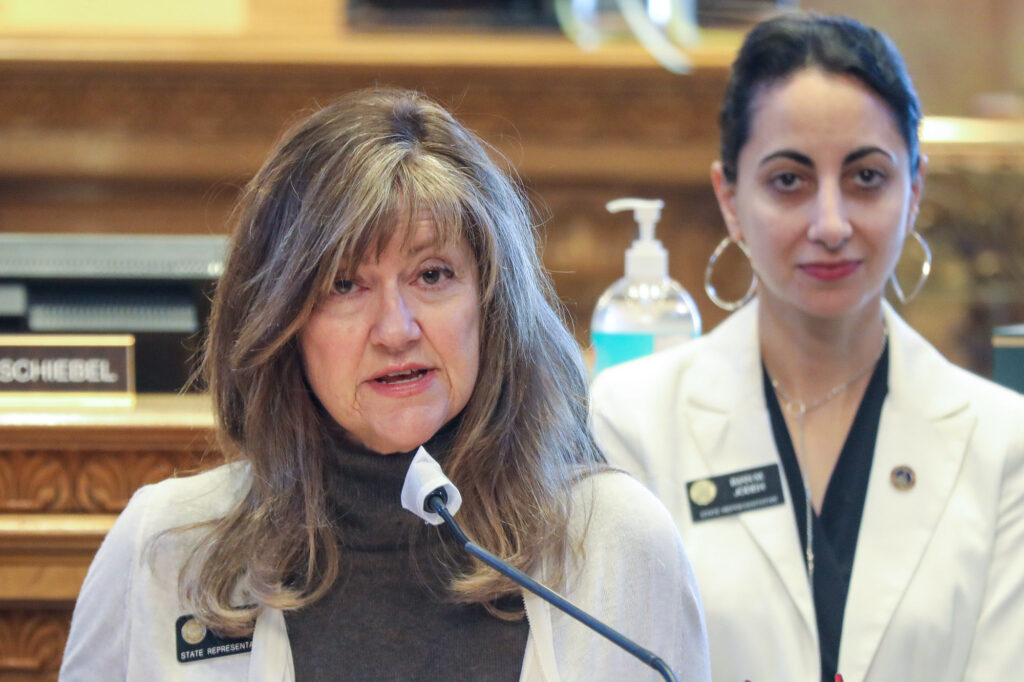
Abortion rights supporters march in Denver, CO in the wake of a leaked Supreme Court opinion that indicates justices will overturn Roe v. Wade in 2022. Credit: Colorado Newsline
Lawmakers in Colorado are considering a pair of bills to bolster existing Colorado law around reproductive health care rights amid an increasingly “hostile” national policy landscape.
Senate Bill 25-129 passed on a party-line vote in the Senate Judiciary Committee, with Republicans voting in opposition. The committee laid over Senate Bill 25-130 at the sponsor’s request and will vote on it later.
Taken together, the bills aim to strengthen Colorado’s protections in anticipation of increased threats of reproductive health care from surrounding states and from the federal government under President Donald Trump.
Senator Lisa Cutter, a supporter of SB25-129 is quoted as saying to reporters that “We don’t want doctors here in Colorado to feel like they can’t provide healthcare that again is protected under Colorado law. Then that will lead to access issues. We are already seeing a huge uptick in demand for services given.”
This comes after abortion was added as a right in the Colorado constitution. According to Colorado lawmakers, after seeing lawsuits surrounding abortion across state lines across the country they wanted to make sure people here were protected from legal proceedings. In addition, the bill would protect people who come to Colorado to get abortion care from different states.
Lawmakers say the bill also would remove providers’ names from abortion medicine prescription bottles as well to protect them from legal investigations.
That 2023 law aimed to protect providers and patients in the state from enforcement of other state’s anti-abortion laws. It states that authorities in Colorado cannot cooperate with those out-of-state investigations into “legally protected health care,” defined as reproductive health care and gender affirming care.
The new bill would prohibit attorneys, local law enforcement agencies and other in-state entities like hospitals and insurers from complying with “hostile” out-of-state investigations into care that is legally protected in Colorado. It would also require anyone requesting a subpoena to affirm that it is not intended to pursue a charge related to protected care.
Earlier this year, a Louisiana grand jury indicted a New York doctor for allegedly prescribing abortion medication online to a Louisiana resident. Texas’ attorney general filed a civil lawsuit against the same doctor last year with similar allegations. Advocates worry states that criminalize abortion will go after doctors in states with expansive reproductive health care access like Colorado.
The bill would also allow a provider to leave their name off a prescription label for mifepristone and misoprostol, which are used in medication abortion. Sponsors say that would protect Colorado doctors who prescribe online or over the phone and then mail medication to patients in another state, as well as doctors who prescribe medication in-person to someone who traveled from a neighboring state and plans to take the pills when they get back home.
A handful of doctors have testified recently in the Colorado legislature that telehealth abortion care is increasingly common.
Another advantage of the bill according to observers is that Colorado health care providers will have a sense of protection knowing full well they have full capacity to operate under Colorado law without other states having to impose their regressive laws on Colorado.
Some on the other hand are worried that the bill could make churches and faith-based hospitals subject to litigation. The bill would allow someone by an out-of-state legal action over their abortion to take that person or entity to court within six years. As written, this private right of action could be so broadly interpreted that any entity that adheres to their sincerely-held belief opposing abortion and advocates against it could face a civil liability in Colorado, especially if they participated in a legal action in a life-affirming state such as Texas or Idaho.

Democratic state Rep. Lisa Cutter, a Jefferson County Democrat is sponsoring the Senate Bill 25-129 . Credit: Colorado Sun
SB-130 would add to state law the emergency abortion protections currently guaranteed in the federal Emergency Medical Treatment and Labor Act. It would ensure access to emergency care to stabilize a patient, including emergency abortions and miscarriage care.
SB-130 is also sponsored by Sen. Julie Gonzales of Denver, Rep. Meg Froelich of Englewood and Rep. Yara Zokaie of Fort Collins, all Democrats.
John Seward, the Vice Chair for Government Relations at the Emergency Medical Services Association of Colorado, asked for an amendment that would clarify that the bill applies to emergency facilities, not the work paramedics do in the field.
“Ambulances are not the same as emergency departments. The training and resources provided in these environments are very different. We need to make sure that we make appropriate clarifications,” he said.
While it is expected that Republicans will likely oppose both bills en masse, the Democrats have wide majorities in both the House and Senate.






